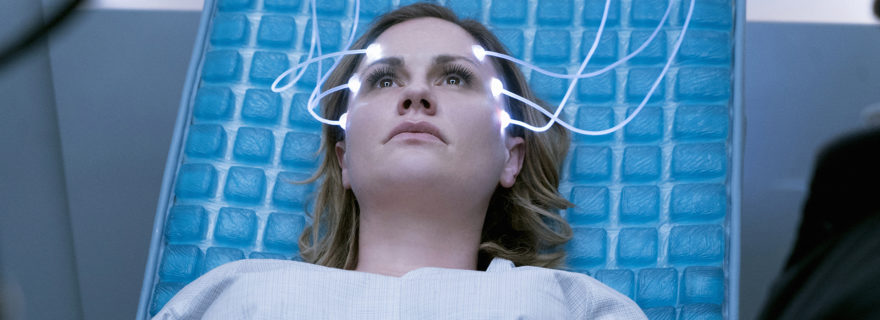Nominally based on writings by the late author of ‘Do Androids Dream of Electric Sheep?’ (better known for its movie adaptation, ‘Blade Runner’), Amazon’s anthology sci-fi series ‘Philip K. Dick’s Electric Dreams’ is perhaps more likely inspired by the success of Netflix’s ‘Black Mirror’. Unfortunately, the first season is frustratingly erratic in quality.
Considering that Amazon’s adaptation of Dick’s ‘The Man in the High Castle’ is one of the Prime streaming service’s flagship shows, one might expect that the ‘Electric Dreams’ project originated there as well. In fact, this is an American/British co-production that was originally intended to air simultaneously on Channel 4 in Britain and the AMC cable network in the United States. Ultimately, AMC dropped the show and Amazon picked it up. (I can’t say conclusively that AMC’s decision had to do with the product’s unevenness, but I wouldn’t be surprised.) Channel 4 began airing it in September of last year, while Amazon released the whole season at once in mid-January.
In addition to the delay, Amazon also shuffled the episodes into a completely different order. I imagine this was probably done to give a better first impression by putting a stronger episode up front. Because this is an anthology of single-shot stories that don’t connect to each other at all (much like ‘The Twilight Zone’ or, as I said, ‘Black Mirror’), the order you watch them in doesn’t matter. However, Amazon’s arrangement has such wild swings from decent to terrible and back again that it’s still likely to put many viewers off before they get through all ten.
The series was produced by Ronald D. Moore (‘Battlestar Galactica’) and Bryan Cranston (who stars in one episode). Its production values are a peculiar mix of expensive visual effects that are usually well done with frequently awful costumes and character designs. In the Cranston episode, military uniforms consist of pajamas with squiggly lines drawn on them. Pretty much every depiction of a robot or android looks like something out of 1970s-era ‘Doctor Who’. The combination of high gloss and ridiculous cheese is perplexing and often derails suspension of disbelief.
I’m not familiar enough with Dick’s writing to know how faithfully these episodes adapt his short stories, but some perfunctory research suggests that they’re extremely loose, and sometimes barely resemble the source at all. Keep that in mind when placing blame for the worst ones.
The Episodes Worth Watching
Amazon’s season starts off on a pretty good note with ‘Real Life’, which stars Anna Paquin as a police detective in some far-off, ‘Blade Runner’-y future year with flying cars and whatnot. After suffering a trauma on the job, she plugs herself into a Virtual Reality “vacation” and wakes up in the body of Terrence Howard in the present day. As she jumps back and forth between these timelines, she finds both equally stressful, and eventually questions which one is her (or his) real life and which is the simulation. The story has a lot of classically Dick-ian themes and pretty effective twists and turns reminiscent of ‘Total Recall’.
Episode 9, ‘The Commuter’, is more fantasy than sci-fi and relies mainly on its concept rather than on visual effects (of which it has few). Timothy Spall plays an aging railway worker whose personal life is in a depressing shambles due to the burden of having a schizophrenic son with a worsening mental condition. After being repeatedly pestered by a mysterious woman (Tuppence Middleton) who insists on buying a ticket to a stop that doesn’t actually exist, he rides the train there and discovers a beautiful utopian community where everyone is happy and the weight of all his problems feels lifted. Of course, peace of mind can’t come quite so easily, and the price he’s asked to pay for it may be more than he’s willing to bear. This may not be the flashiest episode in the season, but Spall is terrific in it and, as a parent, the story just about wrecked me emotionally.
Without question, the season’s highlight is Episode 6, ‘Safe and Sound’. Set in a dystopian near-future society obsessed with security and paranoia about alleged terrorist threats, an innocent high school girl (Annalise Basso) rebels against her political activist mother (Maura Tierney) by purchasing a seemingly harmless virtual assistant wristband device just like all her friends have. In setting it up, she develops a friendship with a nice tech support guy (Connor Paolo), whose interactions with her slowly take a dark turn. The episode is extremely suspenseful and unnerving, not least of all because it feels just on the cusp of plausibly happening in real life.
The final episode in Amazon’s numbering, ‘Kill All Others’, is likewise heavily infused with paranoia and dread. Mel Rodriguez (Todd from ‘The Last Man on Earth’) is a blue collar factory worker driven to increasingly frantic outrage when the country’s sole political candidate (Vera Farmiga) openly advocates murdering the undefined “others” and nobody in the media or his small circle of friends seems bothered by this. While the message of the story may be heavy-handed, it’s laced with amusing satire and is well executed.
Borderline
Given that he’s an Executive Producer, I expected the Bryan Cranston episode ‘Human Is’ to be a centerpiece for the season. Instead, it’s merely mediocre. Cranston plays the cold-hearted commander of a space army who neglects his long-suffering wife to go fight a war on another planet, and later returns from battle a very different man – perhaps literally. Cranston gives a pretty good performance, but the plot is extremely predictable and the outcome of the courtroom climax makes no logical sense. As I mentioned earlier, the costumes are ridiculous. The episode also has an entirely pointless orgy scene in the middle just to fill time.
‘The Father Thing’ features Greg Kinnear as the world’s most loving and supportive parent to a young son obsessed with baseball. Then a meteor shower rains down on the planet and the kid notices that his dad has started acting awfully strange – as have a lot of people all over the world. Kinnear is good, but this is a very straightforward ‘Body Snatchers’ story with zero surprises, and the attempts to mimic Netflix’s ‘Stranger Things’ are pretty shameless.
The Junk
I knew I was in trouble with this series when the second episode took such a steep dive in quality after the first. ‘Autofac’ is set in a post-apocalyptic future where an automated factory continues to churn out useless trinkets long after it has no consumers to buy its products. This creates a dilemma for the small hippie commune of human survivors who worry that the factory’s pollution will choke out their remaining resources. From the premise, it seems obvious that this was probably intended to be some sort of satire about consumerism. (It’s a little ironic that the show ended up on Amazon, when the Autofac itself is an obvious stand-in for that retail giant.) If so, that side of the story is completely muddled and lost in favor of a super-cheesy tale of artificial intelligence and stiff-armed robot people in stupid costumes. No disrespect to actresses Juno Temple or Janelle Monáe, but their characters are dumb, and the plot twist revelations about Temple’s heroine made me roll my eyes. This is also another episode that inserts pointless sex scenes that serve no narrative purpose as blatant filler.
The season’s worst episode is ‘Crazy Diamond’, in which Steve Buscemi is a scientist at a factory that makes synthetic humanoid replicants called “Jacks” and “Jills.” He gets caught up in a dangerous scheme when a femme fatale Jill (Sidse Babett Knudsen from ‘Westworld’) seduces him and convinces him to steal artificial souls that she can sell on the black market. The tone of this piece veers all over the place from goofy humor to film noir mystery. The story is really dumb and makes no sense, and I just flat-out hated everything about it.
I struggled to stay awake during ‘The Hood Maker’, which has something to do with police using telepaths to read the minds of criminal suspects. The populace is rather upset about this and protests against it, and the telepaths themselves are planning an uprising. Or something. Honestly, the episode is so boring that I stopped caring about it early on. Richard Madden (Robb Stark from ‘Game of Thrones’) and Holliday Grainger (‘The Borgias’) are the leads. Apparently, Channel 4 aired this one first in the UK, which seems like a poor strategy for retaining viewers.
Finally, ‘Impossible Planet’ has a somewhat interesting premise about the crew of a tourist space vessel who are chartered to ferry a wealthy elderly woman (Geraldine Chaplin) to see a long-forgotten planet called Earth. The old lady doesn’t know that Earth doesn’t exist anymore, so they try to con her by passing off a similar planet instead. Along the way, the woman thinks that the somewhat sympathetic hero (Jack Reynor from ‘Sing Street’) is her grandfather, whom I guess she’s in love with? And it turns out that maybe he is? Or it’s all a dream? Or maybe they’re all dead? I don’t know. The plot of this one doesn’t even attempt to make sense. It’s incredibly frustrating, and it features another stupid robot. This one looks like a grown-up Twiki from ‘Buck Rogers in the 25th Century’.
Verdict / Grade: C+
With only four episodes out of ten that I would classify as “good,” two more that are merely middling, and four that are frankly terrible, the first season of ‘Electric Dreams’ has a pretty damn crappy hit ratio. Considering all the talent involved, that’s a huge disappointment.
Fortunately, as an anthology show with no direct narrative connections from one episode to the next, you can skip right to the good ones and are under no obligation to watch the rest. I consider four episodes legitimately worth your time. The others, not so much.
If this series is lucky enough to get a second season, it’s going to need to put a lot more effort into consistency.





William Henley
For some reason, the first episode that came up when I watched the show was The Hood Maker. I found it boring, and didn’t even finish the episode – I had no interest in seeing how they were going to resolve the story. The second one I watched was Real Life, which was predictable to anyone who has ever seen Total Recall or watched Outer Limits.
I think part of my issue is that you have no real connection with the characters, as that changes every episode, and even the universe the show takes place in changes from one episode to the next. This worked well for Outer Limits and Twilight Zone, because they would cast fantastic actors, have great directors, and awesome story writers, all of which seem to be missing from Electronic Dreams.
I feel that it is almost unfair to judge an entire series off of only two episodes, but I just found myself bored by the two I saw. I wanted to like this show, I have been looking forward to it, but what we got just seems to be crap with a high production value – like someone ate gold, and then we were given the results that came out the other end.
Based on this review, I don’t think I will be missing anything if I decide not to watch the rest of the season – especially if Real Life is considered one of the better episodes.
Vidfreek
I loved Real Life and yes, I consider it to be one of the best episodes of the season.
Only one so far that I didnt care for was Crazy Diamond that one just made no sense at all and the story was totally pointless. Otherwise I’ve liked most of the episodes more than the latest Season of Black Mirror, I still have a few more to watch though but overall, I think its pretty damn good